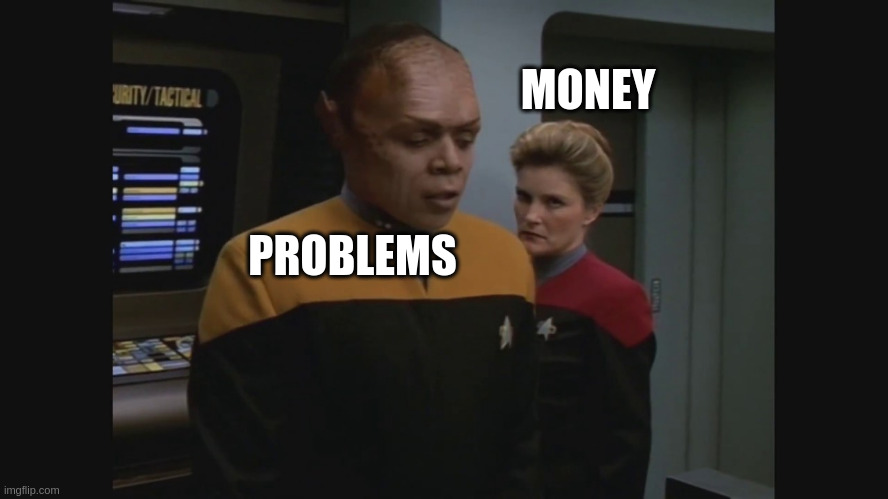I’m guessing the phrase originated with people who have money?
I think it’s more like, people who have transitioned from having no money, where money would solve a lot of problems, to having money, where those problems have been replaced with other problems, and they are shocked to discover that having money doesn’t eliminate all problems. Even if they have fewer problems than they did when they had no money, their current problems are more frustrating because they expected to have fewer problems with more money.
I feel like there’s got to be a point on the curve where the money to problems ratio is just right lol.
The hard part is that point moves. I have very few problems. And insurance covers some things (supposedly). But if my spouse died and I suddenly had to throw child care into the mix, and changing my schedule to be the one that takes them to/from school… I could easily wind up where new problems form. I thought I had enough money, but I only had enough money for the specific circumstances
Yeah, there’s definitely a z-axis on that graph which represents time. Good point.
There was a study about that around 15 years ago and the number was $78,000. Money does make you happy and solve problems to an extent, or rather it eliminates miserable situations created by poverty. Beyond that though, it’s up to you to find happiness. This was 15 years ago, so that number is probably double now.
I am so far from happiness circa 15 years ago lol
Keep striving! You seriously can do it. Keep learning. Keep working. Keep trying, and don’t give up. Make a plan, set some goals, write them down, and follow through with it. It shouldn’t be as ridiculously fucking grueling hard to claw your way up the latter as it is, but it’s worth it when you get there.
Some people stressed about paying rent. Some people stressed about paying mortgage. Some people stressed about paying loan on their investment. Some people stressed about being assassinated on the street.
It’s more of a gratitude and cash flow issue. You can stopped at any point, but most people just want more.
They have more problems because they’re problematic people, and problematic people with lots of financial resources create tons of problems. Money solves most problems for responsible people. Not all problems obviously, but most.
At least in the context of the song, I’m pretty sure the “mo’ problems” part comes from the fact that having “mo’ money” makes you a bigger target for people who would want to cut themselves in on your money and/or your sources of money.
Also, biggie had to work for his money, deal with the corporate record industry, and lived in a high-crime neighborhood. If you don’t have to work, and you can afford to outsource your problems to others, then you can have a lot of money without problems.
“no money no problems”

More like
“No capitalism, no problems”

Because that’s the logical fallacy of Denying the Antecedent . If “it’s raining” then “the sidewalk is wet”. Knowing that it’s raining tells us something about the sidewalk, it’s not dry, it’s wet. And knowing the sidewalk is dry tells us something, it can’t be raining (because if it was, the sidewalk would be wet).
But knowing “it is not raining” doesn’t tell us about the sidewalk (it could be dry, it could be wet, maybe it rained earlier, maybe a dog peed on it). And similarly knowing the sidewalk is wet doesn’t tell us anything about the rain.
So even if “mo money causes mo problems” all that tells us is that someone with mo money will not be problem free. People with no money might also have mo problems, the syllogism doesn’t tell us about that.
The use of the word “more” in “more money more problems” indicates that both money and problems are continuous variables. Thus, the statement should be modeled with predicate logic, but with analysis. As phrased, the sentence implies a positive derivative between the two variables. If assumed to be valid over the complete range of possible values, “less money, less problems” indeed follows.
If assumed to be valid over the complete range of possible values,
Which is where this logic fails. The saying is usually constricted to the range of “a lot of money” to “way too fucking much money”, with money less than “a lot of money” not included. Therefore the derivative can be positive, negative, zero, or anything really. Also to be pedantic technically the derivative doesn’t need to exist for a positive Δmoney to yield a positive Δproblems.
You forgot one thing. If it’s raining, it might be pouring. But it might not be pouring. If it IS pouring however, the old man IS snoring.
So rain doesn’t equal old man snoring, but pouring rain does.
Y intercept is non-zero.
Problems Vs money looks more like y = (x - 5)^2 + 2
On behalf of the mathematically challenged:

Ideally, you would aim to have roughly 5 units of money, because at that point, you’ll have the least amount problems possible. If you have more ore less, there will be more problems. Interestingly, if you have negative money (i.e. debt) you can have lots of problems, but so do those who have a lot of money. Also, the amount of problems you have increases quite rapidly as you deviate away from the sweet spot.
So what you really need in life is 5 monies. Got it.
Yes, this represents that age where we had the optimal balance of being fully financed by parents yet getting a small allowance we didn’t have to spend on anything. I.e. no problems. Anything else = more problems
5 money, 2 problems.
more oxygen = more problems / no oxygen = no problems
Cuz it doesn’t, more money -> more solutions. At least that’s how I use it.
More money, more problems is referring to an excess of money. As in having too much causes problems, which is on the other end of the spectrum from having too little money.
When you have an excessive amount of money it draws attention and malicious behavior. Getting wealthy suddenly often means family coming out of the woodwork to try and get some of it, sales people will want to sell things, etc.
It is a saying that leaves out the important part, just like “money is the root of all evil” leaves out the “love of money” aka greed part.
So the real saying should be “love of money is the root of all evil” and “an excess of money leads to more problems”. They went with more money because it flows better.
Interesting take. I’ve always interpreted this phrase as a folksy way of saying a cascade of causality or a progression of responsibilities.
I think this phrase also has origins in extreme poverty, not from extreme wealth. Greed has a lot to do with why the world is shitty but I don’t think that’s the “wisdom” this phrase is trying to express.
Because the predicate is false to begin with.
More like “more claims denied = more problems (for the CEO)”
money means more complex problems and a larger possible drop until you reach escape velocity where its almost impossible to fail unless someone shoots you in the head in new york.
More money, more problems is just a lie.
The only problem you can have with money that wouldn’t be replaced or superceded by other problems is having bills. If you don’t have money, it’s very easy to not have bills. But then you’d also not have a home or probably anything else, which is a bigger problem than having bills.
No money = suprisingly enough, straight to jail.
Because you only get mo problems after you get mo than you need.
Not sure what it is with inflation, but a while ago the number was like 75k?
Money = happiness until you reach whatever threshold that’s at today, and after that mo money doesn’t get you mo happiness, just mo problems.
I believe the number is now closer to $110k and even then you are one major hospital visit from being back on the problems train.
The trick is to make more money, but don’t live like you do. Just save the money. And then be able to retire young with millions in the bank
Yep.
A big tip that helps is most people aren’t wired to hoard resources, so when we accumulate a lot our brains want to trade that for a dopamine hit which can lead to reckless spending.
But our brains are kind of stupid, and easy to trick.
Drop $100 on a fun thing, or go online and make an extra mortgage payment, pay a credit card, or even just deposit it into a savings account.
Our brain just sees that resources went down, a good thing happened, and dumps some dopamine.
I only read the original study years ago and never saw any followups.
But as far as our brains are concerned, the same thing just happened, so it gives the same dopamine.
Diogenes would beg to differ.








